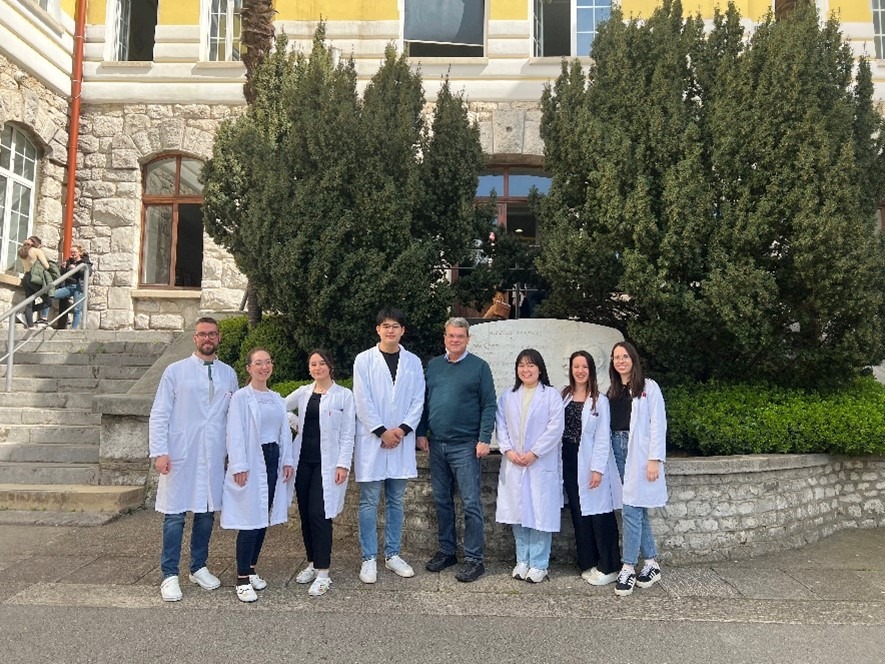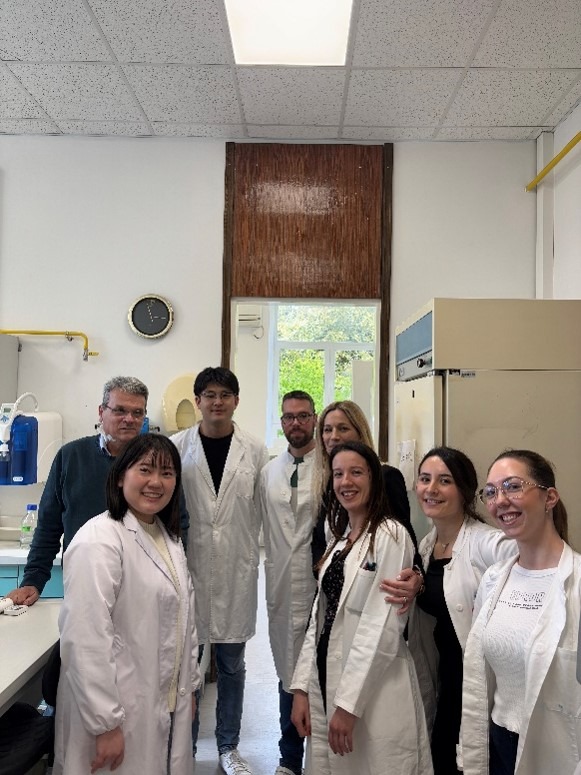International and Domestic exchange
Chiaki Morita
After completing my research abroad at the University of Rijeka in Croatia
I studied abroad at School of Medicine at the University of Rijeka in Croatia for about three weeks. First of all, I would like to express my sincere gratitude to everyone who supported me in participating in this study abroad program and to everyone who gave me this wonderful opportunity. This was my first "study abroad" program at our university, and while I was excited and excited, I was also very nervous. However, as if to surpass those feelings, my study abroad at the University of Rijeka was a very fruitful experience in my life.
I belonged to a laboratory that integrates three departments: Department of Immunology, Physiology, and Physiology. In the laboratory led by Professor Lučin, research is mainly conducted on "cytomegalovirus." When an uninfected pregnant woman is infected with this virus, the fetus is infected and develops cytomegalic inclusion disease, and when the virus is reactivated by opportunistic infection, it develops retinitis, interstitial pneumonia, enteritis, etc. Cytomegalovirus has a structure including double-stranded DNA, a regular icosahedral capsid, and an envelope. Upon infection, it remodels the membrane system in the infected cell, securing a route for the virus to exit the cell, and further assembles and expels virus particles by making good use of the functions of endosomes. Currently, research is being conducted with a focus on how cytomegalovirus reorganizes the membrane structure in infected cells and clarifying the details of the virus's expulsion route, with the ultimate goal of finding structures and processes that can be used as therapeutic targets. I had the opportunity to observe and experience the general experiments being conducted in this research.
During the first week, we did experiments such as SDS-PAGE, Western blotting, immunofluorescence staining, cell counting, cell culture, time-dependent observation of intracellular viral proteins using 3D Cell Explorer, and counting the number of virus colonies. The experiment that left the biggest impression on me was cell culture. It was one of the experiments I had always wanted to try, so I was very happy and full of motivation when the professor asked me if I wanted to try it. However, when I actually tried it, it was not an easy experiment. This is because we cultured mouse fibroblast cells of the NIH3T3 variety using various tools such as electric pipettes and petri dishes in a clean bench, and there was a possibility that the cells would become infected with resident bacteria. It was my first time culturing cells, and I was inexperienced, so no matter how careful I was, I would touch parts of the petri dishes and pipettes that I shouldn't touch, and I had to redo it several times. The professor did not show any displeasure when I was struggling, but he encouraged me by saying, "Don't worry, you will fail at first!" Thanks to the teacher's kind and careful teaching, when I was able to observe under the microscope how the fibroblasts were successfully cultured in the petri dish, I felt a sense of relief that they had been cultured without infection, and a sense of joy and accomplishment that I had been able to culture them with my own hands. Other experiments that were very interesting were making gel plates for SDS-PAGE, which I had never experienced in the Department of Biochemistry training at this university, and counting the number of cells using a hemocytometer, which I had only seen in class.
Over the next week, we performed immunofluorescence staining of viral proteins and capsids present in infected cells and observed them with a fluorescence microscope and a confocal microscope. A confocal microscope allows you to zoom in on cells and structures that you want to observe in more detail, and can obtain high-resolution, high-contrast images. Therefore, we were able to clearly examine where the viral proteins are present in the cytoplasm and nucleus, or whether they are present there at all, which was the purpose of this experiment. During the experiment, it was very useful to discuss and consider with the professor why viral proteins are not present in the cytoplasm and nucleus. I also performed SDS-PAGE and Western blotting by myself from start to finish. I performed experiments with samples that used inhibitors that prevent viral growth and maturation and samples that did not, and I was very happy that the results were as I had predicted, that the viral protein markers would be fainter when inhibitors were used, and that the professor praised me for doing a good experiment.
In addition to research, I had the opportunity to participate in a lecture for third-year students during the final week. The content of the class was about antigens and antibodies in Department of Immunology, immune responses, and tests using antigen-antibody reactions. The class format was such that each student was responsible for one or two slides in the entire class, and each student summarized and presented their findings in 15 minutes. This is not a typical class format in Japan, so I was confused at first, but I was very inspired by the proactive attitude of the medical students, who were in the same year as me, who learned and spoke on their own accord, and who answered questions immediately when asked by the teacher.
During the weekday evenings, we had free time to enjoy sightseeing in the town of Rijeka and neighboring towns such as Opatija and Bakar. On the weekends, we also visited famous tourist cities such as Zagreb, Dubrovnik, Plitvice National Park, and Rovinj, experiencing Croatian nature and culture and enjoying traditional cuisine. Furthermore, we had the opportunity to have international exchanges with international students coming to our university this year and medical students from the University of Rijeka from various countries, and we were able to spend a very meaningful time.
Through these three weeks, I realized that even though the research environment and tools used are different, setting goals and hypotheses, conducting experiments, examining the results, and thinking about the next experiment, which I thought were different between Japan and Croatia before studying abroad, are the same. Also, watching the Croatian medical students, I learned that it is important to be proactive and express your opinions, such as ``I think this way'' and ``I want to do this.'' And while talking with them, I felt that I wanted to be able to express my opinions in English more than I am now. Therefore, I would like to further improve my English skills.
Finally, I would like to thank all the professors at our university who supported me in my study abroad, including Ito-san, Professor Lučin of School of Medicine at Rijeka University, the professors in my lab, Paola-san, Mitsui-kun who spent three weeks with me, and everyone who was involved. I would like to continue to make use of the experiences I gained from this study abroad experience and take on anything with a spirit of challenge.

